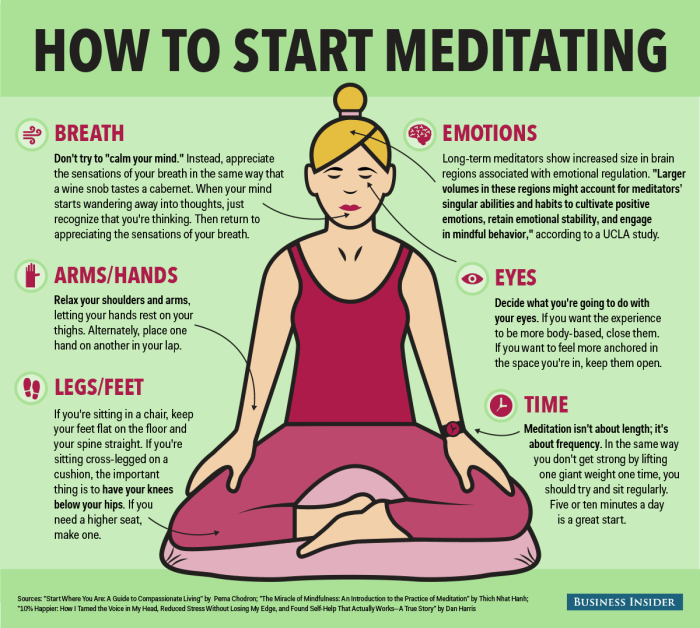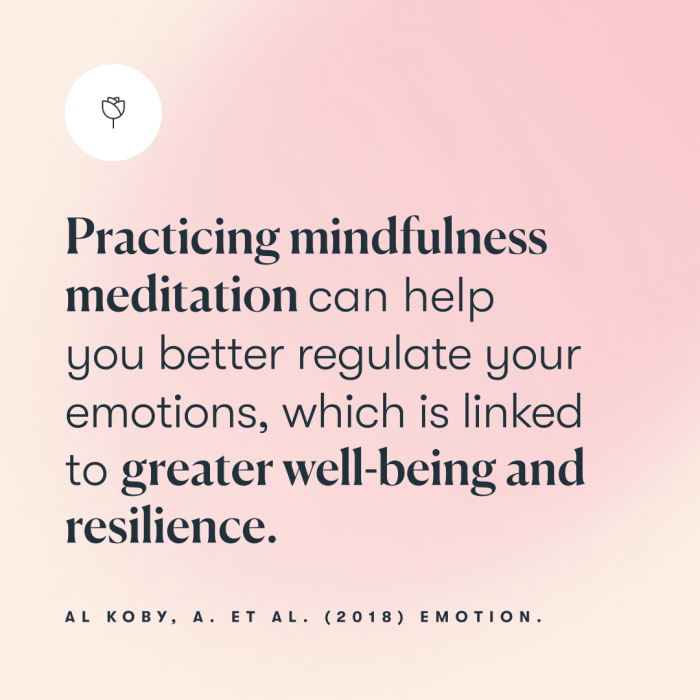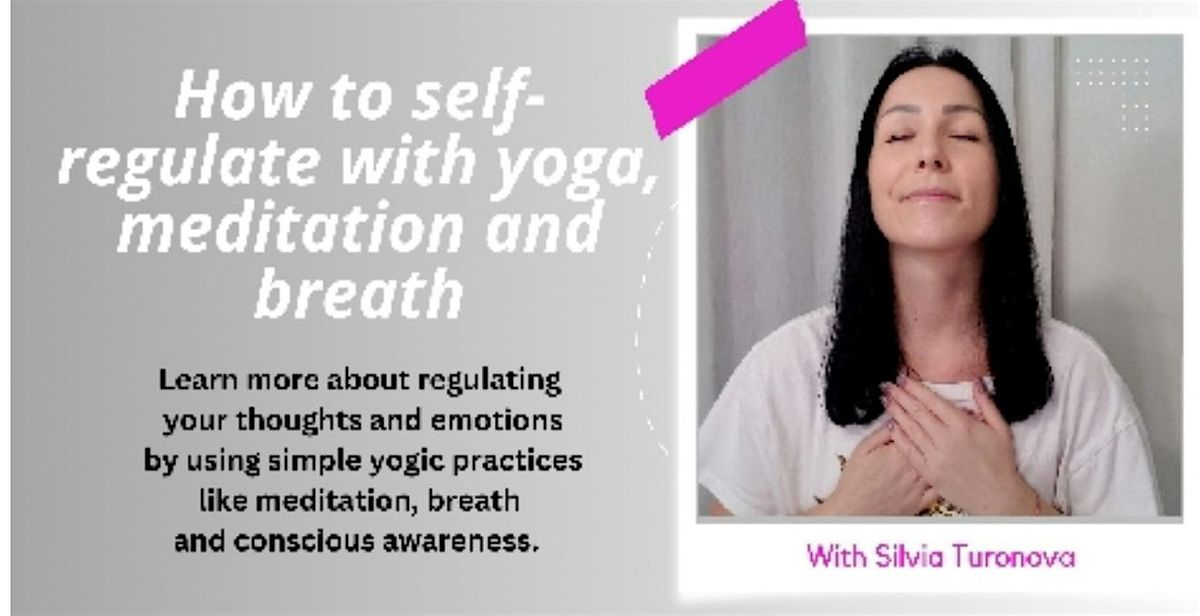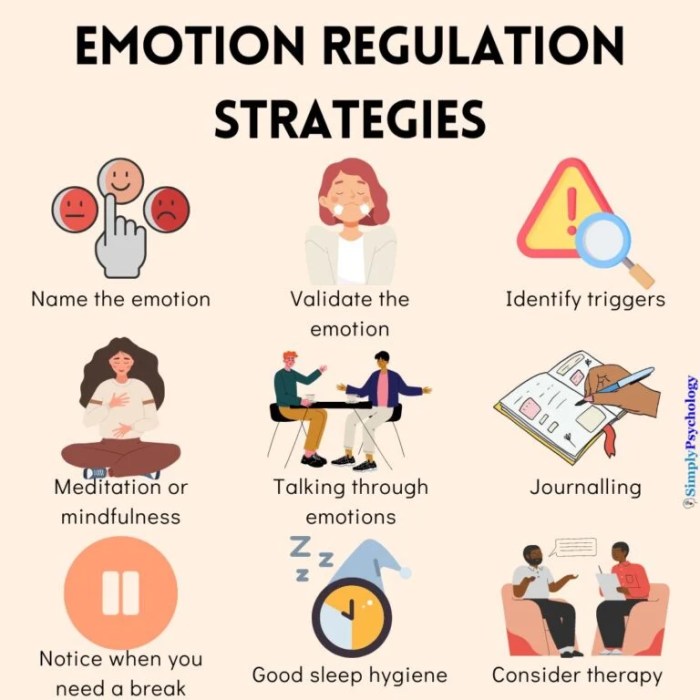How to Meditate for Better Emotional Regulation opens the door to a transformative journey towards improved emotional well-being through the power of meditation. Delve into the world of mindfulness and self-discovery as we explore techniques and practices to help you regulate your emotions effectively.
Discover the key to inner peace and emotional balance as we unravel the benefits of meditation in fostering a healthier mind-body connection.
Introduction to Meditation for Emotional Regulation

Emotional regulation refers to the ability to manage and control one’s emotions effectively in various situations. It plays a crucial role in our daily lives, impacting our relationships, decision-making, and overall well-being. When we struggle with emotional regulation, it can lead to stress, anxiety, conflicts, and other negative consequences.Meditation is a powerful tool that can help improve emotional regulation by promoting mindfulness and self-awareness.
Through regular meditation practice, individuals can learn to observe their emotions without judgment, identify triggers, and respond thoughtfully rather than react impulsively. This increased awareness and self-control can lead to better emotional regulation and a more balanced emotional state.
Benefits of Incorporating Meditation for Emotional Well-being
- Meditation helps reduce stress and anxiety levels, which are common triggers for emotional dysregulation.
- By cultivating mindfulness through meditation, individuals can develop a greater sense of emotional awareness and resilience.
- Regular meditation practice can improve focus and concentration, allowing individuals to better regulate their emotions in challenging situations.
- Meditation promotes relaxation and a sense of calm, which can counteract feelings of anger, frustration, or overwhelm.
- Over time, meditation can help rewire the brain, enhancing emotional regulation skills and promoting overall emotional well-being.
Types of Meditation Techniques

There are various meditation techniques that can be beneficial for improving emotional regulation. These techniques help individuals develop a sense of calmness, self-awareness, and compassion towards themselves and others.
For instant stress relief, try these 5 Easy Meditation Exercises that are simple yet effective in calming your mind and body. Incorporate them into your daily practice for a more peaceful and balanced life.
Mindfulness Meditation
Mindfulness meditation involves focusing on the present moment without judgment. By paying attention to sensations, thoughts, and emotions as they arise, individuals can learn to regulate their emotions effectively.
When it comes to strengthening your mind through meditation, it’s important to start with the basics. Check out these 5 Tips for Meditating to Strengthen Your Mind to get started on the right path.
-
Example: Sit comfortably, close your eyes, and focus on your breath. Notice any thoughts or feelings that come up without getting attached to them. Bring your attention back to your breath whenever you get distracted.
Building mental resilience can be a powerful tool in facing life’s challenges. Learn how to incorporate meditation into your routine with these tips on Building Mental Resilience through Meditation to help you stay strong and focused.
Loving-Kindness Meditation, How to Meditate for Better Emotional Regulation
Loving-kindness meditation cultivates feelings of love, kindness, and compassion towards oneself and others. This practice can help individuals develop empathy and reduce negative emotions like anger and resentment.
-
Example: Visualize someone you care about and silently repeat phrases like “May you be happy, may you be healthy, may you be safe, may you live with ease.” Extend these wishes to yourself and others as well.
Body Scan Meditation
Body scan meditation involves systematically focusing on different parts of the body, bringing awareness to physical sensations. This practice can help individuals release tension, reduce stress, and connect mind and body.
-
Example: Lie down or sit comfortably, and slowly scan your body from head to toe. Notice any areas of tension, discomfort, or relaxation. Breathe into these sensations and allow them to soften.
Steps to Start Meditating for Better Emotional Regulation: How To Meditate For Better Emotional Regulation

Starting a meditation practice can be a transformative journey towards better emotional regulation. Here is a step-by-step guide for beginners to begin their meditation practice:
Create a Conducive Environment for Meditation
- Find a quiet and peaceful space where you won’t be disturbed.
- Dim the lights and create a comfortable seating arrangement.
- Consider using calming essential oils or incense to set the mood.
- Use cushions or a meditation mat to support your posture.
Consistency and Setting Realistic Goals
Consistency is key when starting a meditation practice for emotional regulation:
- Start with short sessions, such as 5-10 minutes daily, and gradually increase the duration as you become more comfortable.
- Set realistic goals that align with your schedule and lifestyle to maintain consistency.
- Choose a specific time of day to meditate, whether it’s in the morning to start your day on a positive note or in the evening to unwind and relax.
Mind-Body Connection in Meditation

The mind-body connection in meditation plays a crucial role in emotional regulation, as it involves the interplay between our mental and physical states. By practicing mindfulness and focusing on the present moment, individuals can cultivate a deeper awareness of their thoughts, emotions, and bodily sensations.
Physiological Responses Influenced by Meditation
- Meditation has been shown to reduce levels of cortisol, the stress hormone, in the body. By calming the mind and promoting relaxation, meditation helps to lower stress levels and alleviate feelings of anxiety and tension.
- Regular meditation practice can also improve heart rate variability, which is an indicator of the body’s ability to respond to stress. This can lead to better emotional resilience and adaptive coping mechanisms.
- Studies have demonstrated that meditation can enhance the function of the parasympathetic nervous system, responsible for rest and relaxation. This activation helps to counteract the effects of the sympathetic nervous system, which triggers the body’s stress response.
Role of Deep Breathing Techniques
Deep breathing techniques, such as diaphragmatic breathing or belly breathing, are often incorporated into meditation practices to help calm the mind and regulate emotions. By focusing on slow, deep breaths, individuals can activate the body’s relaxation response and reduce feelings of anxiety and stress.
Deep breathing signals to the brain that it is safe to relax, which can help to regulate emotions and promote a sense of calmness and well-being.
Embark on a path of self-care and emotional harmony by incorporating meditation into your daily routine. Explore the profound impact of mindfulness practices on your overall well-being and take a step towards a more balanced and fulfilling life.